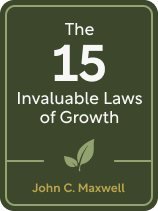

This article is an excerpt from the Shortform book guide to "The 15 Invaluable Laws of Growth" by John C. Maxwell. Shortform has the world's best summaries and analyses of books you should be reading.
Like this article? Sign up for a free trial here.
What’s the Law of Awareness? How can it help you grow and reach your potential?
The Law of Awareness states that to grow yourself, you must know yourself. John Maxwell defines self-awareness and explains how it can help you achieve personal growth. He also recommends a brainstorming activity you can do to improve your self-awareness.
Keep reading to learn about Maxwell’s Law of Awareness.
The Law of Awareness
What’s the Law of Awareness? It’s the concept that, to grow yourself, you must know yourself. Maxwell defines self-awareness as an understanding of your values, passions, and capabilities.
(Shortform note: Maxwell notes that you need these competencies before growth, but for most people, self-awareness and self-worth are lifelong projects. You’ll always be discovering new things about yourself—which is why it’s not uncommon to shift to a new career when your values change. And, for some people, self-worth can be a long journey: Research suggests that self-esteem, which is one component of self-worth, waxes and wanes over the course of a lifetime. Since self-awareness and self-worth fluctuate so much, there’s no “right amount” to have of each before beginning your growth journey—you only need to know and see value in yourself well enough to get started.)
Why Self-Awareness Helps You Grow
According to Maxwell, self-awareness helps you grow because it enables you to think realistically about what your potential looks like. Once you understand your values, passions, and abilities, you can weigh them against each other and use them to pinpoint realistic, achievable goals.
(Shortform note: As you consider what your potential might look like, make sure you’re taking into account all of the parts of life that matter to you. In Designing Your Life, Bill Burnett and Dave Evans explain that it’s important to think about your potential holistically, creating realistic goals in four areas of your life: health, work, joy, and relationships. It’s important to set and pursue goals in all four areas—if you don’t, you’ll end up feeling unsatisfied with those parts of your life you don’t give attention to.)
It’s important to have realistic goals for two reasons: First, they make it possible to create a personal growth journey that’s both accurate to and possible for who you are. Second, they give you a clear target—if you don’t know what your potential looks like, it’s hard to determine whether the steps you’re taking are in the right direction. Maxwell notes that the lack of a clear target can cause you to waste time pursuing a goal that you think is your life purpose but isn’t right for you.
(Shortform note: Maxwell says that setting realistic goals helps you avoid making mistakes—but it’s important not to take this to the degree of perfectionism: the belief that if you make mistakes, you’re a failure. As you grow, you’ll probably make some mistakes, and that’s okay. Mistakes are just a way to refine your self-awareness; you can learn from them and make better choices in the future.)
Develop Self-Awareness: Explore Who You Are
We’ve covered why self-awareness and self-worth are essential to personal growth, as they’re responsible for your ability to create and pursue achievable goals. Now, let’s explore how you can cultivate each of these skills.
To get to know yourself better, Maxwell suggests you brainstorm to determine your interests and abilities:
First, define your values, talents, and passions by answering the following questions: What do you like to do? What are you already good at doing? What is it about these things that captivate you? Are these things important to you, and if so, why?
Then, determine what you’re realistically capable of achieving. Take stock of your strengths and weaknesses, your available opportunities, and your time, energy, and resources.
| Use Self-Awareness to Find Your Life’s Purpose As Maxwell notes, figuring out your purpose in life isn’t as simple as “following your passion”—passion alone doesn’t necessarily lead to fulfillment. While Maxwell urges you to consider your values, talents, and passions, the authors of Ikigai suggest four factors of your life that must intersect if you want to discover your life’s purpose: • What you love doing • What you can realistically accomplish, given your skills and limitations • What you can contribute to the world to help meet its needs • What you can be paid for, if that’s important to you These four factors may get you even closer to success than Maxwell’s suggestions can, in several ways. First, you’ll not only think about what feels good to you or comes to you easily, but you’ll also think about which of your talents or passions is useful in terms of making a living. Second, as we discussed, Maxwell considers helping others one of the main benefits of personal growth. Consciously incorporating this into the way you think about your life’s purpose heightens your chances of accomplishing it. |

———End of Preview———
Like what you just read? Read the rest of the world's best book summary and analysis of John C. Maxwell's "The 15 Invaluable Laws of Growth" at Shortform.
Here's what you'll find in our full The 15 Invaluable Laws of Growth summary:
- Why personal growth is essential to living a meaningful life
- How to build strong character and live with integrity
- How to envision, commit to, and pursue meaningful goals






